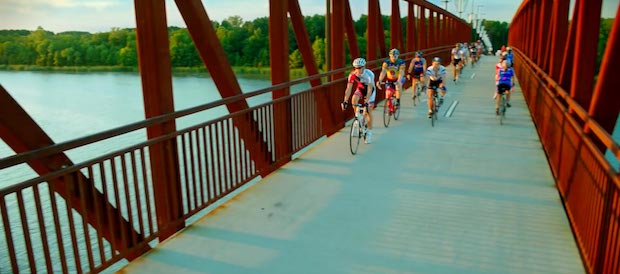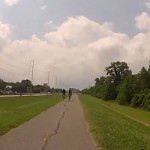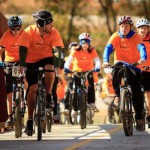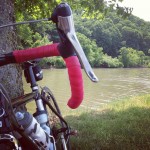 It was a beautiful Saturday in late October when dignitaries from Arkansas and Tennessee gathered on the Harahan Bridge, which crosses the Mississippi River at Memphis.
It was a beautiful Saturday in late October when dignitaries from Arkansas and Tennessee gathered on the Harahan Bridge, which crosses the Mississippi River at Memphis.
They were there to celebrate the opening of the Big River Crossing, a pedestrian boardwalk that allows cyclists and walkers to cross the river.
The $18 million boardwalk, the longest of its kind in the country, was funded by federal, state and local government grants along with private contributions. Cyclists and walkers will share the bridge with Union Pacific freight trains.
“Unless you’ve been a train conductor, it’s a view that you’ve not seen of downtown Memphis since 1949,” Memphis Mayor Jim Strickland said. “It’s such a civic and cultural amenity for our current residents. I think it will draw tourists from all over the world.”
Doug Friedlander of Helena, who’s leading a regional tourism initiative for the Arkansas Delta, put it this way: “Thanks to visionary leadership, this project has put Memphis and east Arkansas squarely on the map of a rapidly growing national passion for bicycling, walking and other forms of outdoor recreation, ecotourism and physical fitness. This unprecedented attraction was the impetus for the St. Francis Levee Board, which manages the levee from Mississippi County to Lee County, to approve the development of a bike trail atop the Mississippi River levee from the bridge’s western terminus in West Memphis all the way to Marianna.”
Three weeks after the event at Memphis, some of the world’s best mountain bikers gathered on the other side of the state for the International Mountain Bicycling Association World Summit at Bentonville. The summit, which is held every other year, attracted more than 500 people from around the world along with about 60 vendors.
The four-day annual summit began in 2004. Previous host cities included Whistler in British Columbia and Steamboat Springs in Colorado.
With five mountain bike trails designated as “epic rides” by the IMBA, Arkansas and Colorado are tied for second behind only California in the number of trails. IMBA has listed Bentonville, Fayetteville and Hot Springs as “ride centers,” and northwest Arkansas has become the IMBA’s first “regional ride center.”
As one Arkansas cycling enthusiast put it, mountain biking and road cycling are “the new golf.”
In other words, they’re activities that people are willing to spend a large amount of money on and travel to pursue. Consider what Alabama — specifically the Retirement Systems of Alabama — did in creating the Robert Trent Jones Golf Trail, a collection of world-class golf courses, many of which have adjacent resort hotels. That effort put Alabama on the tourism map for thousands of wealthy Americans who never would have considered visiting the state otherwise.
Arkansas wants to do that in the area of cycling.
Gov. Asa Hutchinson and the state Department of Parks & Tourism are promoting the state as the Cycling Hub of the South. Hutchinson created a Governor’s Advisory Council on Cycling, and the Walton Family Foundation provided a $309,000 grant to IMPA to maintain the state’s five “epic rides,” which contain almost 200 miles of mountain biking trails. Arkansas is the only state to have full-time professional crews maintain such trails.
In an articled headlined “The unlikely mountain bike mecca of Bentonville” for the website www.pinkbike.com, Danielle Baker wrote: “The only thing I knew about Arkansas before my plane hit the runway at NWA was that Keith Richards had been arrested there in 1975, not long after the state had tried to outlaw rock ‘n’ roll. That was it. As I retrieved my luggage, I wondered what kind of Rolling Stones-hating folk were waiting for me outside the airport.
“Needless to say, I was surprised and excited to find myself in the middle of one of the most elaborate and accessible community-driven trail systems I’ve ever experienced — not to mention greeted and welcomed by some of the warmest and most enthusiastic strangers I’ve come across in the United States. Even with the Walmart head office causing a phenomenal rate of growth, Bentonville is every bit the charming town it was when Sam Walton, the founder of Walmart, opened the original Walton five-and-dime store back in 1950. From the quaint town square, the town’s footprint ripples outward, offering world-class culinary options, microbreweries, colorful boutiques, a state-of-the-art museum and miles upon miles of singletrack.
“Originally mountain biking was developed here as a recruitment tool for Walmart back in 2006. As the largest retailer in the world, there is a need to attract employees to Bentonville and keep them here. The Walton family donated the first piece of land to develop trails on, a trail system that is now affectionately referred to as Slaughter Pen. ‘If you build it, they will come has been proven here,’ says Gary Vernon, a program officer for the Walton Family Foundation. While Bentonville has been fortunate to receive assistance from the foundation, Gary is quick to point out that ‘you can’t just throw money at this.’ He credits great community partners and the volunteers as the heart and soul of Bentonville’s mountain bike culture.
“The terrain, year-round riding and hotels that are full of business travelers during the week, leaving the weekends available, are also part of the perfect storm that is creating a world-class riding destination.”
Baker concluded the article this way: “It might be time to put Arkansas on your bucket list.”
One of those who commented on the article wrote: “I felt like I was in some sort of mountain bike utopia — small town with big town amenities thanks to the Walton Family Foundation. The folks at Phat Tire bike shop were great, and it was an awesome shop that stocked high-end stuff — a proper bike shop in a small town. Lot of transplants from other areas make for a little bit of a metropolitan feel. I can’t wait to go back.”
Another wrote: “There is a Walmart museum and also Crystal Bridges Museum of American Art, which is a completely different thing. It’s a world-class art museum that actually connects to the Slaughter Pen trails network. And it’s free. … I moved back to the area back in August, and it’s everything the article claims.”
Much of the work in northwest Arkansas has been driven by Tom Walton, the son of Jim Walton and grandson of Sam Walton. Tom is the chairman of what’s known as the home region program committee for the Walton Family Foundation.
“Ten years ago, the odds we would join the ranks of hosts like Whistler, British Columbia, or Steamboat Springs, Colo., were pretty long,” he wrote following the IMBA event in November. “But today northwest Arkansas has arrived as a major destination for mountain biking, and we have made trails an integral part of our urban fabric. I had the privilege of sharing the story of how we got from there to here with more than 500 conference attendees from around the world. My message was simply: While each region is different, every community can use trails to improve the quality of life for its residents.
“By connecting singletrack, greenways and city streets across northwest Arkansas, we have attracted new talent and businesses, created transportation alternatives and offered a healthy and vibrant lifestyle. The Walton Family Foundation took a holistic approach, investing not only in trails but also in energizing our urban core with thriving culinary and art scenes. We are also striving to help kids reap the benefits. We are reaching 27,000 students across our region by partnering with schools to redefine physical education through cycling.
“We want to be a place where cycling — and getting out into nature — is a choice everyone can make, every day. And here’s the great thing: Through trails, we can preserve green spaces, even as the region continues to grow and attract more people.”
What’s happening in northwest Arkansas is far from just a Walton initiative, mind you. Take, for example, the work of the Northwest Arkansas Trailblazers…
To continue reading, please click here













